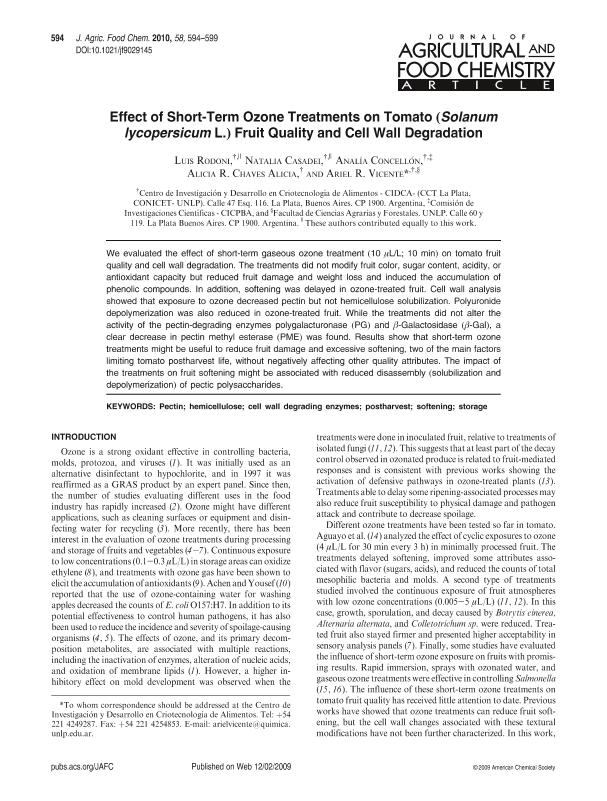Artículo
Effect of short-Term ozone treatments on tomato (Solanum lycopersicum L.) fruit quality and cell wall degradation
Rodoni, Luis Maria ; Casadei, Natalia; Concellón, Analía
; Casadei, Natalia; Concellón, Analía ; Chaves, Alicia Raquel
; Chaves, Alicia Raquel ; Vicente, Ariel Roberto
; Vicente, Ariel Roberto
 ; Casadei, Natalia; Concellón, Analía
; Casadei, Natalia; Concellón, Analía ; Chaves, Alicia Raquel
; Chaves, Alicia Raquel ; Vicente, Ariel Roberto
; Vicente, Ariel Roberto
Fecha de publicación:
01/2010
Editorial:
American Chemical Society
Revista:
Journal of Agricultural and Food Chemistry
ISSN:
0021-8561
e-ISSN:
1520-5118
Idioma:
Inglés
Tipo de recurso:
Artículo publicado
Clasificación temática:
Resumen
We evaluated the effect of short-term gaseous ozone treatment (10 μL/L; 10 min) on tomato fruit quality and cell wall degradation. The treatments did not modify fruit color, sugar content, acidity, or antioxidant capacity but reduced fruit damage and weight loss and induced the accumulation of phenolic compounds. In addition, softening was delayed in ozone-treated fruit. Cell wall analysis showed that exposure to ozone decreased pectin but not hemicellulose solubilization. Polyuronide depolymerization was also reduced in ozone-treated fruit. While the treatments did not alter the activity of the pectin-degrading enzymes polygalacturonase (PG) and β-Galactosidase (β-GaI), a clear decrease In pectin methyl esterase (PME) was found. Results show that short-term ozone treatments might be useful to reduce fruit damage and excessive softening, two of the main factors limiting tomato postharvest life, without negatively affecting other quality attributes. The impact of the treatments on fruit softening might be associated with reduced disassembly (solubilization and depolymerization) of pectic polysaccharides.
Archivos asociados
Licencia
Identificadores
Colecciones
Articulos(CIDCA)
Articulos de CENTRO DE INV EN CRIOTECNOLOGIA DE ALIMENTOS (I)
Articulos de CENTRO DE INV EN CRIOTECNOLOGIA DE ALIMENTOS (I)
Citación
Rodoni, Luis Maria; Casadei, Natalia; Concellón, Analía; Chaves, Alicia Raquel; Vicente, Ariel Roberto; Effect of short-Term ozone treatments on tomato (Solanum lycopersicum L.) fruit quality and cell wall degradation; American Chemical Society; Journal of Agricultural and Food Chemistry; 58; 1; 1-2010; 594-599
Compartir
Altmétricas



